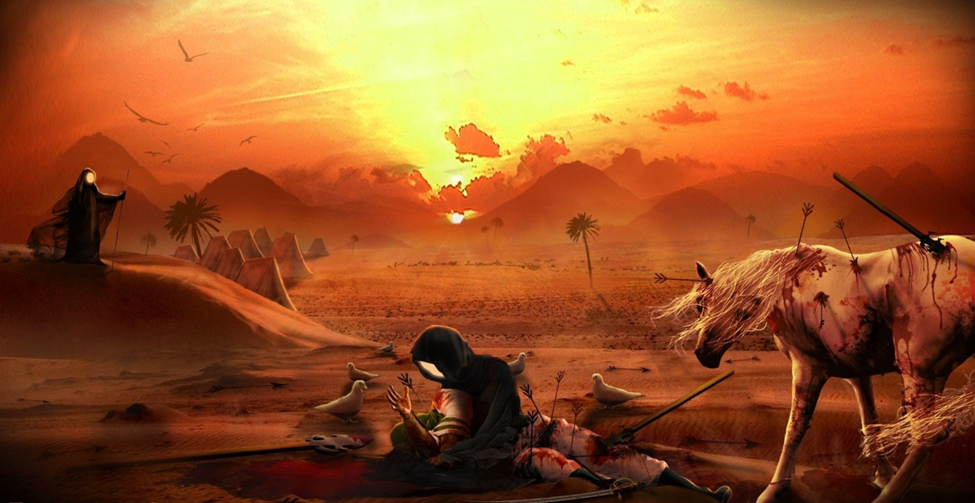
Ashura, the tenth day of Muharram, is a day of great sorrow and remembrance for Muslims all around the world. It also represents a turning point in Islamic history.
The tragedy of Karbala, in which Prophet Muhammad's grandson Imam Hussein (as) the third Shia Imam and his devoted companions gave their lives in defense of Islam, has reverberated for centuries, inspiring innumerable battles for freedom, justice, and human dignity.
The difficult path Zimbabwe has taken to become free of economic sanctions has given poignancy to the story of Imam Hussein.
Battle for Faith and Freedom
Locally, Ashura mourning processions are held in Harare, Mutare, Kadoma, and other locations around Zimbabwe. The mourning commemorations, which are widely characterized by the recitation of nouhas, the delivery of lectures, and torch-carrying ceremonies, serve as a constant reminder and are in tribute to the significant historical event when Imam Hussein's (as) tents were set on fire after he and his 72 companions were martyred on Ashura by the tyrannical ruler Yazid martyred Imam Hussein and his followers during the Battle of Karbala, which took place in 680 AD. Their defiance of injustice and unshakable devotion to truth and justice have made them iconic figures of resistance. This historical event has served as an example for oppressed people all across the world, notably Zimbabweans who have endured decades of economic isolation.
Zimbabwe's long battle against colonial control was a defining feature of its path to independence. The bravery exhibited by Imam Hussein and his adherents is strikingly similar to the sacrifices made by the nation's liberation heroes. Both stories demonstrate the unwavering character of people who put their beliefs ahead of their own interests and are prepared to go through hardships in order to protect their community.
Sanctions: A Modern-Day Oppression
A modern form of oppression emerged as an introduction of economic sanctions on Zimbabwe. This has presented a serious challenge to the citizens of Zimbabwe. Critics for the cause, argue that these policies have unfairly affected regular societies while failing to achieve their desired political goals as a wise man once advised “When evil overcomes one’s soul, even wisdom becomes a scenery of madness and chaos”. The sanctions regime from the West has been compared to a type of modern oppression because it has stifled economic progress, restricted access to necessary commodities and services, and exacerbated poverty.
- Mavhunga puts DeMbare into Chibuku quarterfinals
- Bulls to charge into Zimbabwe gold stocks
- Ndiraya concerned as goals dry up
- Letters: How solar power is transforming African farms
Keep Reading
In this atmosphere, Imam Hussein emerges as a potent emblem of hope and endurance. His tenacity in the face of hardship serves as a reminder that even in the most difficult circumstances; it is possible to overcome hurdles and triumph. Just as Imam Hussein's sacrifice sparked a movement for justice, Zimbabweans have demonstrated incredible tenacity in the face of sanctions, indicating a desire to build a successful and independent country.
Faith for National Resilience
Faith is fundamental to many Zimbabweans' lives, bringing strength, solace, and guidance. The Islamic faith, beliefs focuses on justice, equality, and compassion, has had a profound impact on the country's social and political scene. The commemoration of Ashura allows Muslims to reflect on Imam Hussein's beliefs and be inspired by his legacy.
Furthermore, the shared experiences of suffering and hardship have helped to build a sense of solidarity among Zimbabweans of various faiths. The nation's history has been distinguished by a lengthy struggle for liberty, and the challenges posed by sanctions have strengthened the people's will to build a better future.
As the late former President of South Africa, Nelson Mandela once said
“I have spent more than 20 years in prison, then on one night I decided to surrender by signing all the terms and conditions of the government. But suddenly I thought about Imam Hussain and Karbala movement, and Imam Hussain gave me strength to stand for the right of freedom and liberation and I did”.
Enduring the odds: Building a Stronger Nation
Zimbabwe's path to economic recovery and prosperity will likely be laden with hurdles. However, Imam Hussein's attitude of endurance serves as a light of hope. By drawing inspiration from his legacy, Zimbabweans may harness the force of togetherness, faith, and drive to tackle the challenges ahead.The journey to freedom from sanctions may be long and difficult, but the nation must remain steady in its goal of economic independence of vision 2030. As Zimbabwe can develop a strong and prosperous future for its people by investing in education, healthcare, and infrastructure, as well as creating a favorable business and investment environment. Driven by the mantra “Nyika inovakwa ne vene vayo” by President Cde Ed Mnangagwa A hero, A visionary focused on liberating Zimbabwe from hurdles of economic sanctions and freedom.
In summary, the tragedy of Karbala and Imam Hussein's life continues to resonate with people all across the world, especially Zimbabweans working to establish a brighter future for their country. Imam Hussein's ideals of courage, sacrifice, and justice inspire us in the face of hardship. As Zimbabwe navigates the hurdles created by sanctions, Imam Hussein's legacy provides a road map for overcoming obstacles and realizing national goals.







